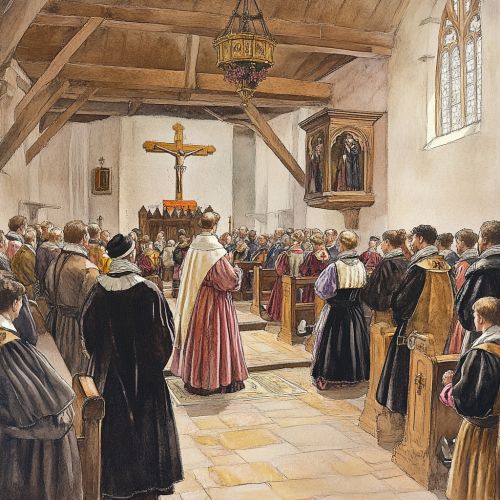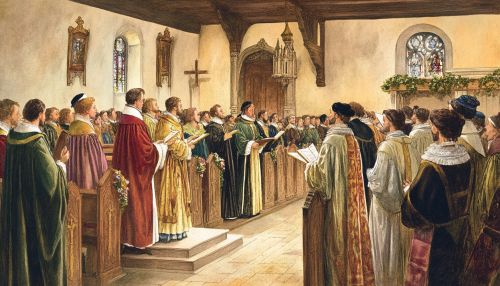Elizabethan Settlement: Difference between revisions
(Created page with "== Introduction == The Elizabethan Settlement refers to the series of legislative acts and policies implemented during the reign of Queen Elizabeth I of England (1558-1603) to establish a moderate form of Protestantism as the national religion. This settlement aimed to unify the country and stabilize religious tensions that had been exacerbated by the reigns of her predecessors, Henry VIII, Edward VI, and Mary I. The Elizabethan Settlement laid the foundation for the Chu...") |
No edit summary |
||
| Line 16: | Line 16: | ||
The Act of Uniformity, also enacted in 1559, aimed to standardize religious practice across England. It mandated the use of the [[Book of Common Prayer]] in all church services, a liturgical text that had been revised to incorporate elements acceptable to both Protestants and moderate Catholics. Attendance at Anglican services was made compulsory, with fines imposed for non-compliance. This act sought to create a uniform religious experience and reduce sectarian divisions. | The Act of Uniformity, also enacted in 1559, aimed to standardize religious practice across England. It mandated the use of the [[Book of Common Prayer]] in all church services, a liturgical text that had been revised to incorporate elements acceptable to both Protestants and moderate Catholics. Attendance at Anglican services was made compulsory, with fines imposed for non-compliance. This act sought to create a uniform religious experience and reduce sectarian divisions. | ||
[[Image:Detail-98083.jpg|thumb|center|An illustration of an Elizabethan-era church service, showing clergy and congregation in traditional attire.|class=only_on_mobile]] | |||
[[Image:Detail-98084.jpg|thumb|center|An illustration of an Elizabethan-era church service, showing clergy and congregation in traditional attire.|class=only_on_desktop]] | |||
== The Thirty-Nine Articles == | == The Thirty-Nine Articles == | ||
Latest revision as of 16:47, 23 September 2024
Introduction
The Elizabethan Settlement refers to the series of legislative acts and policies implemented during the reign of Queen Elizabeth I of England (1558-1603) to establish a moderate form of Protestantism as the national religion. This settlement aimed to unify the country and stabilize religious tensions that had been exacerbated by the reigns of her predecessors, Henry VIII, Edward VI, and Mary I. The Elizabethan Settlement laid the foundation for the Church of England and had profound implications for English society, politics, and culture.
Historical Context
The Reformation in England
The English Reformation began under King Henry VIII, who broke away from the Roman Catholic Church in 1534, establishing the Church of England with the king as its supreme head. This move was primarily motivated by Henry's desire to annul his marriage to Catherine of Aragon. However, the religious landscape remained tumultuous, with subsequent monarchs oscillating between Protestantism and Catholicism. Edward VI, Henry's son, furthered Protestant reforms, while Mary I, Henry's daughter, sought to restore Catholicism, leading to the persecution of Protestants.
Elizabeth I's Ascension
Upon ascending the throne in 1558, Elizabeth I inherited a nation divided by religious conflict. Her primary goal was to achieve religious stability and political unity. Elizabeth, a pragmatic ruler, sought a middle path that would be acceptable to both moderate Catholics and Protestants, avoiding the extremes of her predecessors.
The Acts of Supremacy and Uniformity
Act of Supremacy (1559)
The first significant step in the Elizabethan Settlement was the Act of Supremacy, passed in 1559. This act re-established the monarch's authority over the Church of England, declaring Elizabeth the "Supreme Governor" of the church. This title was a compromise, avoiding the more contentious term "Supreme Head," which had been used by Henry VIII. The act required all clergy and public officials to swear an oath of allegiance to the queen, affirming her supremacy in both religious and temporal matters.
Act of Uniformity (1559)
The Act of Uniformity, also enacted in 1559, aimed to standardize religious practice across England. It mandated the use of the Book of Common Prayer in all church services, a liturgical text that had been revised to incorporate elements acceptable to both Protestants and moderate Catholics. Attendance at Anglican services was made compulsory, with fines imposed for non-compliance. This act sought to create a uniform religious experience and reduce sectarian divisions.


The Thirty-Nine Articles
The Thirty-Nine Articles, established in 1563, were a set of doctrinal statements that defined the theological beliefs of the Church of England. These articles were a compromise between Catholic and Protestant doctrines, reflecting Elizabeth's desire for a middle way. They affirmed key Protestant principles, such as justification by faith and the authority of Scripture, while retaining certain traditional practices, such as the use of vestments and the celebration of the sacraments.
Enforcement and Resistance
Ecclesiastical Commission
To enforce the Elizabethan Settlement, the queen established the Ecclesiastical Commission, a body with broad powers to oversee religious conformity. The commission could investigate, prosecute, and punish those who deviated from the established religious norms. This body played a crucial role in maintaining the settlement's stability, though it faced significant challenges.
Catholic Resistance
Despite Elizabeth's efforts at moderation, the settlement faced resistance from both Catholics and radical Protestants. Catholic recusants, who refused to attend Anglican services, continued to practice their faith in secret. The papal excommunication of Elizabeth in 1570 further intensified Catholic opposition, leading to plots and conspiracies against her rule. The government responded with increased persecution of Catholics, including fines, imprisonment, and execution of those deemed traitors.
Puritan Criticism
On the other end of the spectrum, Puritans criticized the settlement for not going far enough in reforming the church. They sought to purify the Church of England of any remaining Catholic elements, advocating for simpler worship and greater emphasis on preaching. The Puritans' push for further reforms led to ongoing tensions within the church and the broader society.
Impact on English Society
Social and Cultural Changes
The Elizabethan Settlement had a profound impact on English society, shaping its religious, social, and cultural landscape. The establishment of a national church fostered a sense of unity and identity, while also promoting literacy and education through the widespread use of the Book of Common Prayer and the Bible in English. The settlement also influenced the arts, with religious themes and motifs permeating Elizabethan literature, drama, and music.
Political Stability
Politically, the settlement contributed to the stability of Elizabeth's reign. By avoiding the extremes of her predecessors, Elizabeth was able to maintain a broad base of support among her subjects. The settlement also helped to mitigate the threat of foreign intervention, as it presented a united front against Catholic powers such as Spain and France.
Legacy
The Elizabethan Settlement laid the foundation for the Church of England and had lasting implications for English religious and political life. It established a model of religious compromise and moderation that influenced subsequent generations. The principles of the settlement continued to shape English religious policy, even as the church faced new challenges and changes in the centuries that followed.
